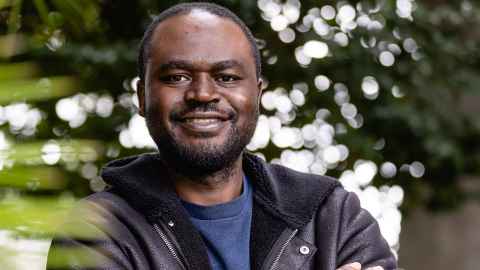Refugee advocate wins social justice award
1 November 2023
Bernard Sama has been recognised for his work to improve Aotearoa's refugee policies, garnering an award for social justice in the process.

Prison should not be used as a place to detain asylum seekers, Aotearoa should welcome more people who are forced to flee their homes due to war or humanitarian crises, and the incoming government should continue work that’s underway to bring about positive change to the country's outdated laws.
This is according to doctoral candidate Bernard Sama, who has just been named the 2023 recipient of the Te Whainga i te Tika Award for Social Justice, established to honour the work of Professor Emerita Jane Kelsey and to recognise outstanding contributions to social justice in Aotearoa New Zealand or internationally.
The social justice champion, who came to New Zealand as a refugee claimant after being displaced from Cameroon where he had worked as a human rights lawyer, has undoubtedly made outstanding contributions to social justice. Since gaining refugee status here, he has worked tirelessly to create change in a system that he experienced first-hand.
Bernard has played a pivotal role in realising two significant improvements for refugees in Aotearoa New Zealand – the first was ending the highly problematic practice of detaining refugee claimants in prisons and police cells. The second was seeing resettlement support extended to refugee claimants and those recognised as refugees after arriving as refugee claimants.
Bernard's initial experiences in Aotearoa New Zealand drove him to pursue his PhD.
Although he had looked into what immigration officials might require from him on arrival and how he would need to present his statement and submissions, Bernard was dismayed by the interview process, which he likened to a criminal investigation.
"What was shocking for me going through that process was just how in-depth, exhausting and often re-traumatising these interviews are. I was asked questions that I didn't feel relevant and that I thought were sometimes culturally ignorant, and at times, re-traumatising."
In light of his experience, and following conversations with others who had been through similar, and often much worse, interview processes, Bernard decided to delve deeper.
"I wanted to gather other experiences and to undertake research to see how we could go beyond and push for change."
In his PhD research, which is currently under examination, Bernard interviewed asylum seekers and the key professionals working with them, including refugee status determination officers, to explore how the refugee and protection status procedure in New Zealand could be improved to enhance well-being, social justice, and human rights.
Bernard, who's the board chair of Asylum Seekers Support Trust, worked collaboratively with the asylum-seeking community and civil society sector to successfully advocate for and engage the government for positive structural changes in the treatment of asylum seekers.
"Prompted in 2019 by worrying preliminary results in my PhD from interviews with some of the asylum seekers who had been detained, I decided to work with the asylum community and concerned civil societies to advocate for the government to end the use of police cells and prisons to hold people seeking asylum," says Bernard, who encouraged asylum seekers to share their lived experiences of detention with Amnesty International Aotearoa in a 2021 study.
In May 2021, Amnesty released its findings in a report that uncovered deeply concerning experiences and called on the government to ensure the law and practice on detention conformed with UN guidelines and NZ laws.
The launch of the report, engagement with the government, and community work led Amnesty International to embark on a nationwide campaign calling for the government to end the detention of asylum seekers in criminal justice facilities, pushing the government to independently review the law and system.
In May 2022, the government released the findings of the independent review and accepted all the recommendations of the report, including ending the practice of detention in criminal justice facilities and committing to reforming the law. This has resulted in asylum seekers, in good faith, no longer being detained in police cells and prisons, although a law to require this has yet to come into force.
"Achieving this milestone has been truly spectacular for the sector as civil societies have pushed for over 30 years to no avail for the government to end the detention of asylum seekers in criminal justice facilities," says Bernard.

Bernard says completing his application for the Te Whainga i te Tika Award for Social Justice reminded him of all the work he had undertaken during his PhD over the past four years.
"It was a good way to reflect on all of the things I have done, and getting recognition for the work I have done for the community is exciting; it's like the icing on the cake!"
The recognition is sweet, but of course, there's still so much that Bernard would like to see change.
"We can definitely do more in the refugee space. I would like more pathways for community sponsorship and for our government to increase the quota programme.
"One thing that I know we don't do as well as other countries is to accept or even support people who need to flee their homes due to war, conflict and human rights issues. Aotearoa makes it exceptionally hard for people from such countries to come here unless they are a doctor, judge or lawyer, but there are so many people who need help."
Media contact
Sophie Boladeras I Media adviser
M: 022 4600 388
E: sophie.boladeras@auckland.ac.nz